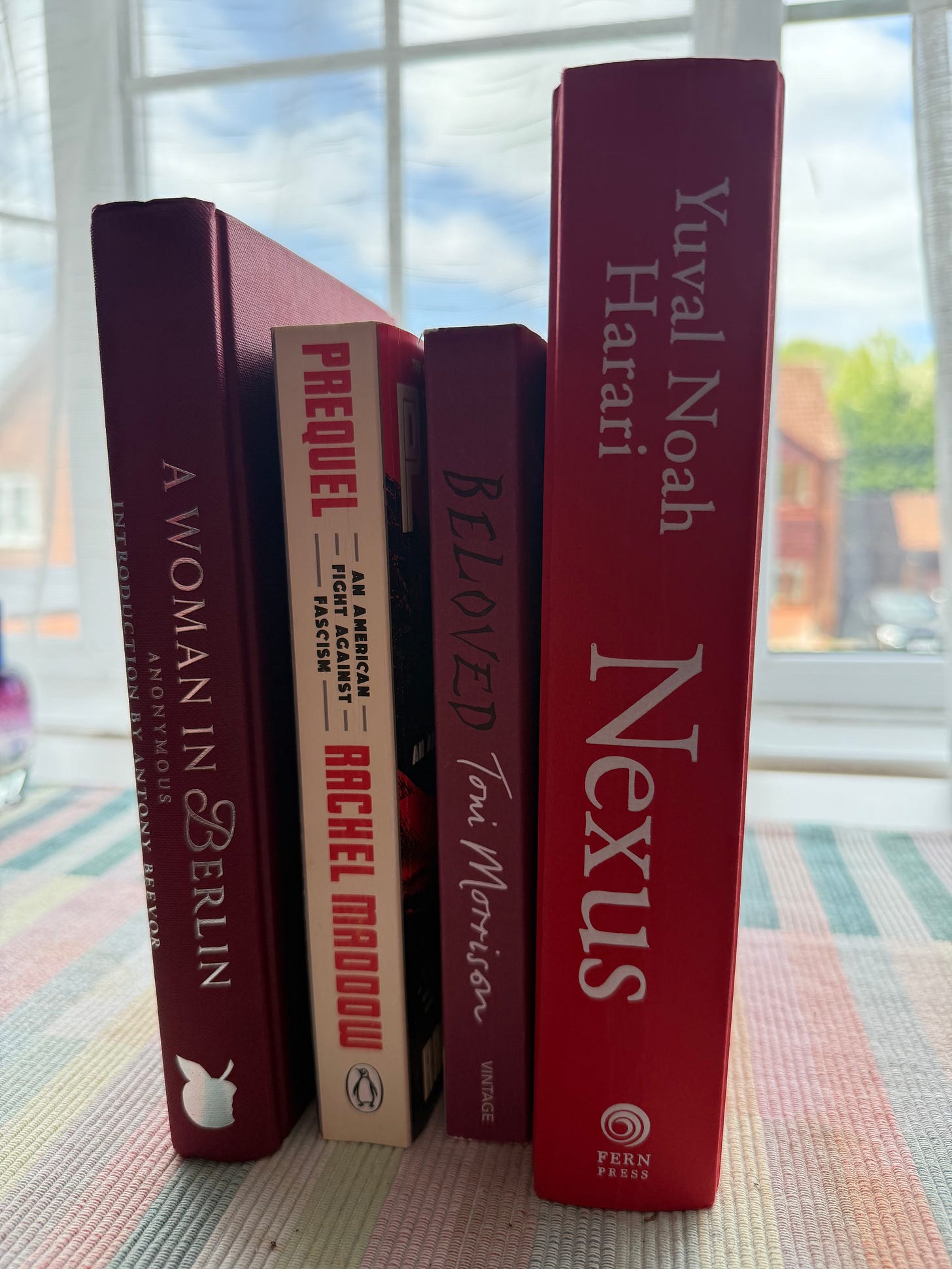April was a reading month that gave me more questions than answers, a pile of books that forced me to look again at the world we live in, to sit with discomfort, to reckon with the absurdity and fragility of the so-called civilised order. These were not books for idle distraction or soft amusement. They were brutal, beautiful, maddening, and in some cases, damning. They made me think hard. They made me feel harder.
Yuval Noah Harari’s Nexus was the first to strike, and it did so with surgical precision. This isn’t a book with a tidy moral or a hopeful arc. It is an autopsy. Harari takes the scalpel to humanity’s swollen ego and lays out, with clinical elegance, the story of how our species—so brilliant, so inventive, so addicted to power—came to dominate the planet and push it to the brink. What Harari does so well, as always, is lace the grand narrative of civilisation with a deep understanding of our psychological machinery. He doesn’t let us off the hook. “Homo sapiens conquered the world because it is the only animal that can believe in things that exist purely in its own imagination,” he writes. That single sentence, like so much of Harari’s writing, haunts you. It calls into question everything from religion to nationalism to the fragile scaffold of modern finance. Harari is a master of distillation, but not without bias. There are places where his voice rings more as pundit than prophet, his political leanings peeking through the academic robes. And yet, even in disagreement, one cannot help but admire the sheer audacity of his vision. He is not a neutral observer—he is a man with a telescope trained on the abyss, shouting to the rest of us to look up before we fall in.
From the rational to the spiritual, Beloved by Toni Morrison took me somewhere altogether more emotional, more tangled, more primal. This novel is a ghost story, but the ghost is not just a dead child—it is slavery itself. I loved the start of the book, the way it plunged me headfirst into a world where the line between madness and memory had been irreparably blurred. Morrison opens with one of the most chilling lines in literature: “124 was spiteful. Full of a baby's venom.” That sentence sets the tone for the entire novel—a tone of quiet dread and poetic devastation. But as the book wore on, I found my grip on it loosened. Perhaps unfairly, I held it up against the likes of Roots or The Colour Purple, and it faltered slightly. The middle sagged for me, and the ending didn’t offer the emotional crescendo I hoped for. Still, one cannot dismiss Morrison’s brilliance. She is a mythmaker, a conjurer of pain and transcendence. This book, even in its missteps, is a pillar of American letters. Its place in the canon is assured, its language unforgettable, and its ache—its deep, unhealed ache—lingers.
Then came Rachel Maddow’s Prequel, which should come with a stiff drink and a cold towel for the back of the neck. I have long admired Maddow’s ability to cut through noise like a razor. Her voice, particularly in her podcast Ultra, is the voice of urgent, unflinching reason in a political climate so thick with lies it might as well be a gas leak. Prequel is a book about fascism—not the European kind we think we understand, but the domestic, well-dressed, flag-waving, all-American kind that was smuggled in through the backdoor of patriotism in the 1930s and ’40s. “It turned out that the United States had come closer than we’d thought to being undone from within,” she writes, “not just by fringe weirdos, but by sitting members of Congress, by decorated war veterans, by national celebrities.” This book is a necessary reckoning. It reads like a thriller but hits like a documentary. Maddow does not sugar-coat or sentimentalise. If you’re wringing your hands about Project 2025 or muttering darkly about the trajectory of the Western world, this book gives you the historical scaffolding to understand how these things happen—not in a single revolution, but in a thousand small surrenders. It’s not comforting, but it is clarifying.
Lastly, A Woman in Berlin. My God. This book is not just a memoir—it is a howl from the belly of hell. Written anonymously by a German woman during the final days of World War II, it is a diary of what happens when society collapses and all protections, especially for women, are stripped away. Anthony Beevor called it “one of the most important personal accounts ever written about the effects of war.” He is not wrong. This book should be required reading for anyone who believes war ends with the ceasefire. “The Russians are coming” takes on a nightmarish literalism here. The city is a carcass, its women defiled again and again in the name of conquest and revenge. And yet, astonishingly, the book is laced with gallows humour and biting intelligence. The narrator is no passive victim. She is wry, scathing, occasionally even cold in her assessment of what survival requires. One entry reads, “I’m no longer a human being, I’m a piece of meat.” It’s almost too much to bear. And yet, bear it we must. I found a second-hand copy online, yellowed with age and stained with someone else’s coffee. It felt almost sacrilegious to read it in comfort. I’ve seen war, participated in its orchestration, but nothing prepared me for this. This is not a book to be loved, but one to be preserved like evidence, to be held in the trembling hands of history and whispered about in classrooms and cabinets of memory.
This, then, was April. A month of brutal truths, ghost stories, dictatorships past and present, and the unbearable weight of what human beings are capable of. Each book in its own way was a flare shot into the sky, illuminating the wreckage we’d rather not look at. But look we must. Because literature, at its best, doesn’t rescue us from the world. It forces us to see it clearly.
If you've made it this far, you're either a fellow glutton for literary punishment or someone who, like me, believes books are the last remaining mirrors worth holding up to the world. Each title I read—and share here—is part of an ongoing project not just to document the chaos of human history and emotion, but to distil it into stories, essays, and reflections that might make sense of it all, or at the very least, make the madness feel less lonely.
If you’re enjoying these dispatches—whether it's the historical deep dives, the political essays, the bloodied fiction, or the occasional sideways glance at the absurdity of modern life—consider becoming a paid subscriber. What you get is simple: everything I write, fiction and non-fiction, delivered hot from the furnace. Every chapter, every essay, every gritty revelation typed at 1am while the world sleeps and the mind won’t. You keep the lights on. You keep the keys clacking. You keep the stories coming. And in return, you get access to all of it—raw, unfiltered, and honest as hell.
Subscribe now, and let’s keep building something worth reading.












